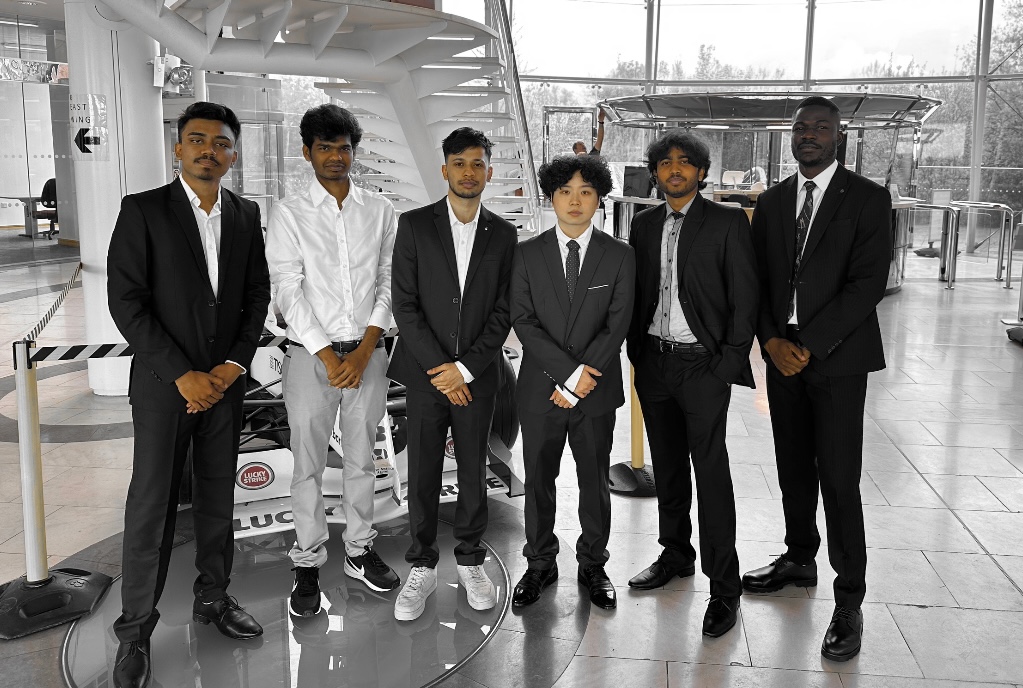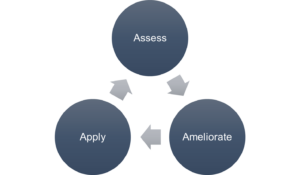Hubert Ovie Madise: My group design project
31/05/2023

‘Hubert Ovie Madise, what have you been up to the past ten weeks?’
The Cranfield School of Water, Energy and Environment (SWEE) Group Design Project (GDP) module – that’s what! The SWEE GDP module is one of the aspects of the Advanced Chemical Engineering MSc course that captivated me and led to my choice of this esteemed postgraduate institution.
As an individual committed to personal and professional growth, I highly valued my experience in the SWEE GDP module. It allowed me to engage in my passion for self-improvement while contributing effectively to the project’s success. Along my academic and professional journey, I have developed essential skills in effective communication (written and verbal), effective leadership, people management, time management, teamwork, problem-solving, project management, and critical evaluation. Despite achieving positive outcomes and receiving constructive feedback, I am always happy to improve.
Effective teamwork skills have proven to be instrumental in enhancing the overall quality of projects based on my personal experiences. I firmly believe that a cohesive group that maximises the potential of each team member is essential, especially in a diverse multinational environment. Moreover, I have come to realise the importance of critical evaluation and time management in complementing teamwork. These two aspects inspire innovative problem-solving approaches, leading to enhanced collaboration and expedited project completion.
During the initial stage of the project, I recognised the need for improvement in these crucial skills. This realisation was further reinforced during the midway peer review session of the SWEE Group Project module, where I received invaluable feedback from both my teammates and a staff member. While the feedback emphasised my strengths in communication, hard work, project management, and leadership, it also pinpointed specific areas that required further development.
As a firm believer in the power of feedback for personal growth, I have devised the ‘triple-A model’ – a comprehensive approach to self-improvement. This model encompasses three crucial steps: assess, ameliorate, and apply (as illustrated in Figure 1). By diligently evaluating my abilities through constructive feedback, I identify areas for enhancement and take proactive measures to make necessary improvements. A key element of this process is actively seeking ongoing feedback, allowing me to continuously assess, ameliorate, and consistently apply my refined skills. With this systematic approach, I confidently embrace growth and development as an individual.

Figure 1. Triple A Model
By embracing the triple-A model, I actively pursue a perpetual cycle of self-improvement. I harness feedback to enhance my abilities and achieve greater levels of performance. This introspective methodology empowers me to effectively tackle the weaknesses highlighted by my peers, honing my teamwork, critical evaluation, and time management skills with confidence and precision for the betterment of my team and our project.
Added to my improved essential skills, I have gained and strengthened technical and soft skills as a project manager, researcher, and experimentation and simulation data analyst in the SWEE GDP – “Conventional Flow Meters for Hydrogen Metering: Challenges and Solutions”. Our project involved extensive planning and culminated in a detailed 15-minute presentation to staff and clients. The project achieved notable success, and its findings have significant value for industry, government, academia, and stakeholders. I am pleased to report that our presentation received positive feedback, confirming the project’s success.
I would like to express my gratitude to my exceptional teammates – Yepeng Jiang, Bhuvan Poladiya, Abdul Rameez, Karan Gada and Gokul Raj Rajendran, whose contributions greatly impacted both the project and my personal and professional growth. They infused project management with an element of interest and enjoyment. It is also essential to acknowledge our remarkable tutor, Dr Liyun Lao, a Principal Research Fellow in Energy and Fluid Systems at Cranfield University’s Centre for Energy Engineering. His invaluable guidance and expertise played a crucial role in shaping the direction of this project, and I am genuinely thankful for his support.
Throughout this endeavour, I have experienced substantial growth in all areas I sought to improve, which has fuelled my enthusiasm for my future professional endeavours. I am eagerly looking forward to applying the skills and knowledge I have gained to make a meaningful impact in my career.
Categories & Tags:
Leave a comment on this post:
You might also like…
From classroom to cockpit: What’s next after Cranfield
The Air Transport Management MSc isn’t just about learning theory — it’s about preparing for a career in the aviation industry. Adit shares his dream job, insights from classmates, and advice for prospective students. ...
Setting up a shared group folder in a reference manager
Many of our students are now busy working on their group projects. One easy way to share references amongst a group is to set up group folders in a reference manager like Mendeley or Zotero. ...
Company codes – CUSIP, SEDOL, ISIN…. What do they mean and how can you use them in our Library resources?
As you use our many finance resources, you will probably notice unique company identifiers which may be codes or symbols. It is worth spending some time getting to know what these are and which resources ...
Supporting careers in defence through specialist education
As a materials engineer by background, I have always been drawn to fields where technical expertise directly shapes real‑world outcomes. Few sectors exemplify this better than defence. Engineering careers in defence sit at the ...
What being a woman in STEM means to me
STEM is both a way of thinking and a practical toolkit. It sharpens reasoning and equips us to turn ideas into solutions with measurable impact. For me, STEM has never been only about acquiring ...
A woman’s experience in environmental science within defence
When I stepped into the gates of the Defence Academy it was the 30th September 2019. I did not know at the time that this would be the beginning of a long journey as ...







Comments are closed.